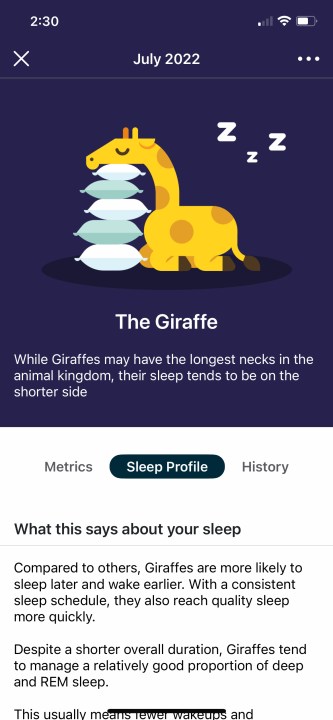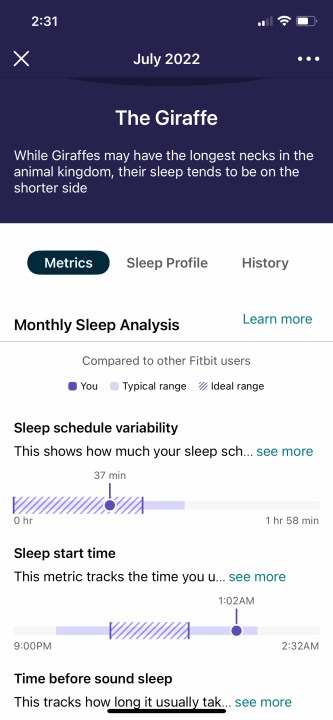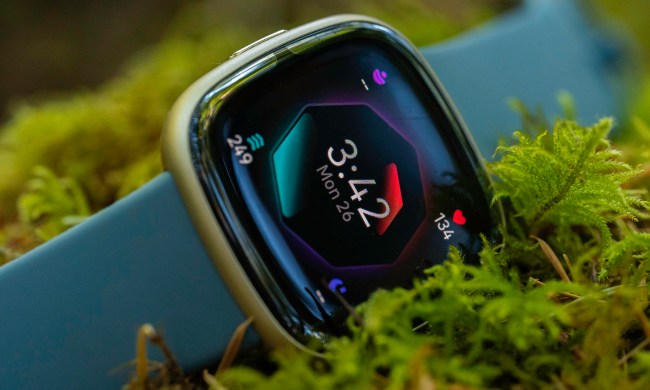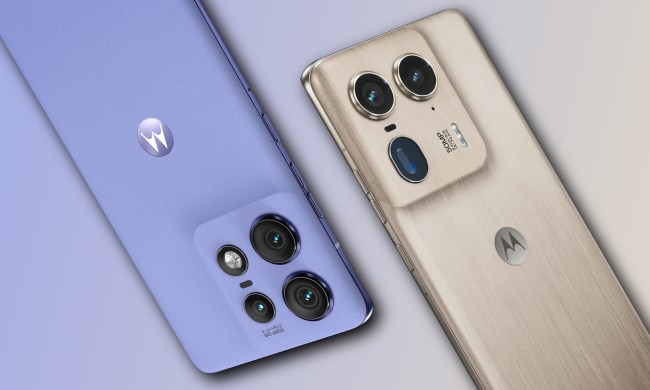Sleep is something that I’ve struggled with my entire life. As I grew into an adult, I took a lot of steps to ensure that I would be getting the best sleep possible. I’ve allowed myself to have some time without screens before bed, done mindful relaxation exercises, and settled into a regular sleep schedule. By the start of my senior year of college in 2019, I was getting the best sleep of my life, thanks to a lot of hard work and mindful practices. Then 2020 hit and the world slid into a downward spiral — and with it, so did my sleep.
For the past two years, I’ve been back to struggling just about every night. After trying out Fitbit’s newly introduced Sleep Profiles feature for Fitbit Premium members, however, I’ve found that I’m able to combat my poor sleeping habits better than ever before. Fitbit has always had excellent sleep tracking, allowing users to see what sort of sleep they’re getting via a score out of 100. But Sleep Profiles elevates the tracking, giving me the ability to properly analyze where I’m falling short.
What Sleep Profiles actually does
Sleep Profiles is an analytical tool that looks at multiple pieces of your sleep data collected over an entire month, helps you analyze it, and shows you comparisons to how other people are sleeping. For example, there were plenty of areas where I was right down the middle in terms of the average person, like my sleep duration (roughly six and a half hours) and my sleep stability. In other spots, I was pretty far off from the average range like the poor restorative sleep I get and my sleep start time (averaging a 1:02 a.m. bedtime.)

In addition to showing people where they fall when compared to others, Sleep Profiles assigns them an animal that corresponds to their sleep habits. There are six in total (I got the giraffe), and what’s nice about Sleep Profiles is that it makes it clear that there isn’t a good or bad animal to get. This was something that put me at ease because on nights when I know I need to be getting good sleep (like before major events), I tend to psyche myself out and sleep terribly — waking to feel completely unrested. If Sleep Profiles were to have told me that every night was crucial for me to get a good animal or risk being stuck identifying as something bad like a dung beetle or something, I would have slept terribly every single night.
The unfortunate thing about the animal assignment, however, is that it’s not very in-depth. The actual analysis side of Sleep Profiles does the heavy lifting when it comes to informing you about your sleep behaviors and what they mean, while the animal is just a bit of flavor text that doesn’t mean a whole lot in the end. Yes, it’s fun to see which animal I got, but it doesn’t provide any level of greater understanding when it comes to my sleeping habits.
While the connection from your sleep patterns to your assigned animal is a little shallow, the analysis that the other portion of Sleep Profiles does is really deep — especially when paired with the rest of the sleep analysis that Fitbit does every night. The Sleep Profile that I got was super informative, giving me plenty of answers to questions I’ve always had about my sleep but never knew who to ask. For example, I rarely feel rested when waking up, even when getting a lot of sleep, and Sleep Profiles was able to show me why. It’s a great tool to use if you need to understand specifically what’s happening in your brain after the lights go out.
So much sleep data, if you’re patient
One aspect of Sleep Profiles that’s something of a tough sell is that it takes an entire month to analyze your sleep trends and start reporting its findings to you. At the start of each month, you’ll get a new report on how you’re sleeping (as long as you wear your Fitbit to bed at least 14 times), but that’s still quite a bit of time to wait if you’re looking for information quickly. Obviously, there’s no way around that, as it comes with the territory of doing sleep studies, but it was still quite the wait.
Luckily, in the meantime, you’re able to check out the nightly sleep data that your Fitbit automatically tracks. It’s an excellent sleep tracker that provides all sorts of helpful information about how you slept each night, providing plenty of resources that can help you analyze nightly patterns. Hands down, the best analysis comes from the monthly Sleep Profile, but the individual night sleep tracker does the job just fine while you’re waiting.
One complaint I have about Sleep Profiles that’s gone unmentioned so far is that when you’re looking at the actual analysis of your monthly sleep averages, the scale it shows you is almost completely devoid of numbers. It gives you the range of what you’re looking at and where you fall in that range but doesn’t provide any other numerical context for what the ideal range is and where the average person falls in it. This left me guessing about what specifically I should be aiming for when it comes to making improvements. There are some obvious changes I could make to see differences in next month’s profile — like going to bed at a more reasonable time. But with the vaguer metrics, it’s hard to know what I should be aiming for.
The other aspect of Sleep Profiles that’s a letdown is that while it helps you interpret the data it’s collected so that you’re more informed about your sleep habits, you have to take a look at individual nights in order to find advice on how to improve your scores. It’s not the end of the world, as Fitbit provides a lot of great information there on how to best improve your nights, but it feels a little unintuitive and confusing. At the very least, it would have been helpful to have a quick link under each section in the Sleep Profiles part of the app that takes you to the appropriate advice in the nightly sleep score section.
Improving my sleep one night at a time
Recommending Sleep Profiles is extremely easy since it comes bundled with the rest that Fitbit Premium has to offer. If you want to make the most out of your Fitbit, a Premium subscription will absolutely help you do that, and Sleep Profiles is just another excellent addition to an already excellent service. In terms of Sleep Profiles’ worth on its own, it’s probably the best sleep tracking that you’re going to find outside of doing a clinical sleep study. The advantage that Fitbit has over sleep studies, however, is that it can track your sleeping for a much longer time. This makes Sleep Profiles a vital tool for those who, like me, could use a much longer look at their sleep habits in hopes of improving them.

Personally, I look forward to what Sleep Profiles will tell me next month as I use start using its advice and data to better shape my sleep. There’s so much information provided that it almost seems like a foregone conclusion that I’ll be sleeping better in September despite its at-times unintuitive UI. By then, I imagine that I’ll be well rested and yawning less — all thanks to Sleep Profiles.





